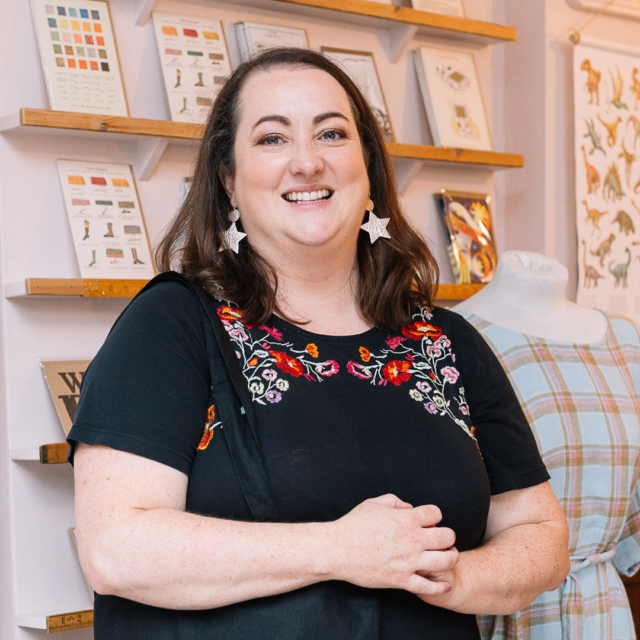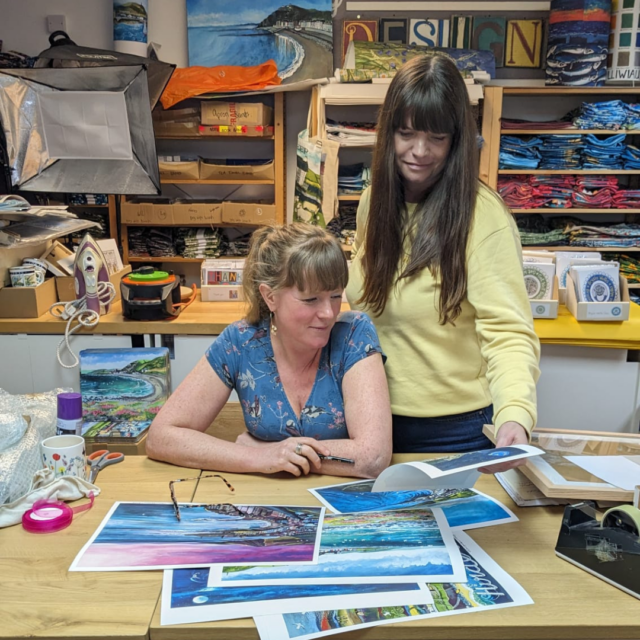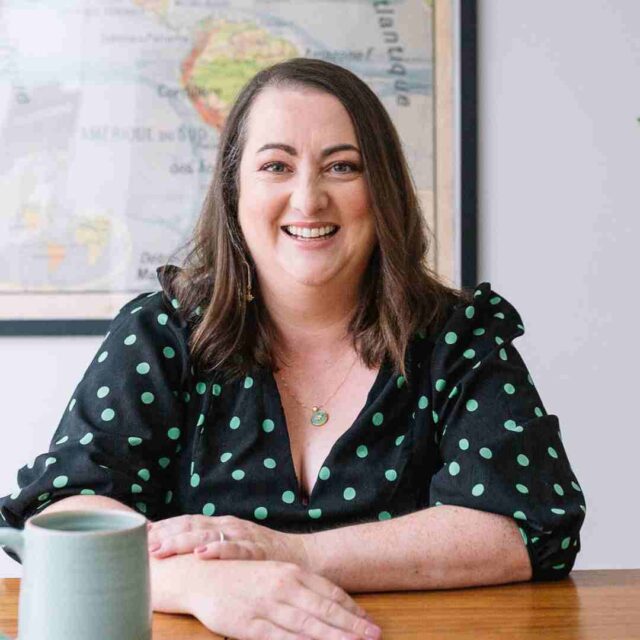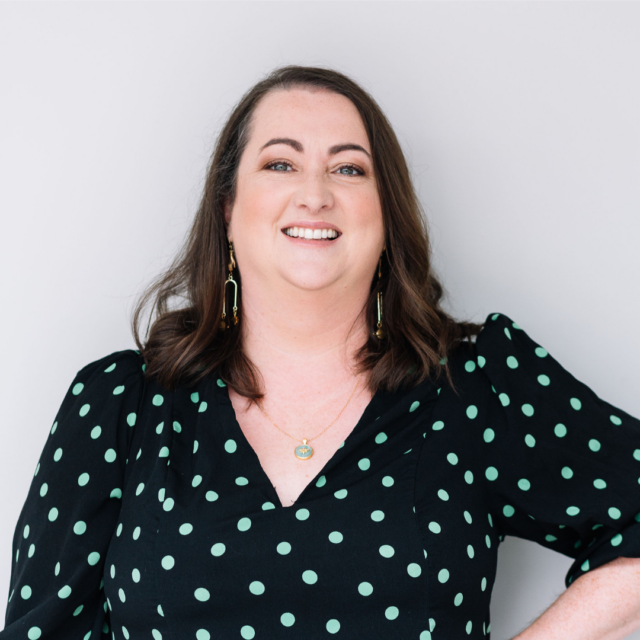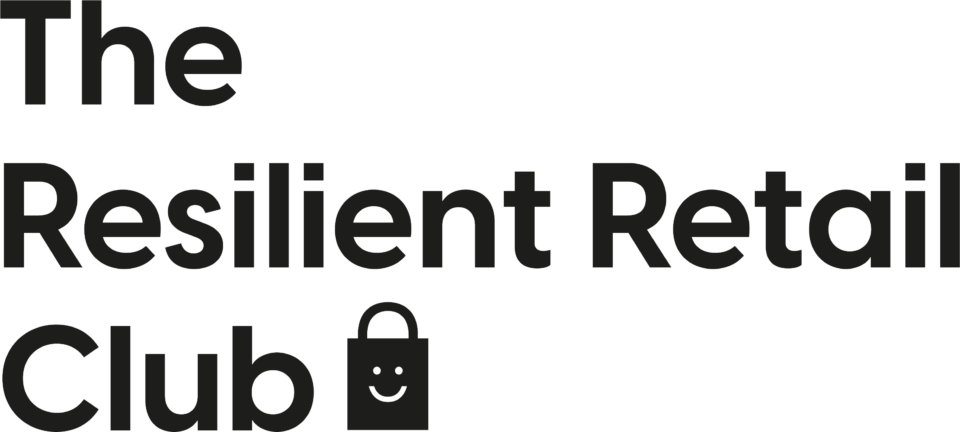Creating a Productive Team with Hayley Watts
Catherine Erdly: Welcome to episode number 185 of the Resilient Retail Game Plan. Hi, I’m your host, Catherine Erdly. Before we get started, I’d love to invite you to head over to retailroar.co.uk That’s retailroar.co.uk and get your free ticket for our amazing free online summit. We have the best of the UK’s entrepreneurs ready to share their story about how they went from their parents basement or their back room, spare room, kitchen table to being one of the UK’s fastest growing companies, having a global brand or having a multi million pound turnover. You aren’t going to want to miss these stories. I’m so excited to share them with you.
Plus we have eight amazing experts ready to share their thoughts about how product businesses, e commerce brands, independent retailers and boutiques, bricks and mortar stores, anybody who sells products. What they need to think about getting ready to spring into 2024.
So go check it out retailroar.co.uk.
But onto today’s episode, we are joined by Haley Watts, who is a coach and facilitator. And she’s going to be talking about something that a lot of people I know find tricky. And that is how do you manage your team? How do you grow a productive team? And how do you look after your health and wellbeing as a founder?
Welcome to the Resilient Retail Game Plan, a podcast for anyone wanting to start, grow or scale a profitable creative product business with me, Catherine Erdly.
The Resilient Retail Game Plan is a podcast dedicated to one thing, breaking down the concepts and tools that I’ve gathered from 20 years in the retail industry and showing you how you can use them in your business.
This is the real nuts and bolts of running a successful product business, broken down in an easy, accessible way.
This is not a podcast about learning how to make your business look good. It’s the tools and techniques that will make you and your business feel good.
Confidently plan, launch and manage your products and feel in control of your sales numbers and cash flow to help you build a resilient retail business.
Hi Hayley, welcome to the podcast. Do you want to start by introducing yourself and what you do?
Hayley Watts: Yeah, absolutely. So I’m Hayley. I work with corporate businesses to help people to be more productive, to know that they’re focusing on the right thing. And working with small business owners to help them do a similar thing, give them some external accountability, a bit of a sounding board often for people’s ideas.
You know, when you’ve got a small team or you’re working on your own, it can be hard when you’re in your head. So helping people to get out of their heads and focus on the work that’s going to move them forward.
As the team grows, how do you (as the founder) stay productive?
Catherine Erdly: Okay. That’s amazing. Fantastic. So let’s start with productivity. One of the hardest things I think when I talk to people whose businesses are growing, one of the hardest things for them as a founder is actually make the business more productive as the team grows, which might sound counterintuitive, but I always think about someone who said to me that as the team grew bigger, he had to employ somebody full time to do something that was taking him half an hour a day. And it’s that sort of feeling as the team grows, how do you stay productive? Basically, again, get your money’s worth?
Hayley Watts: Yeah, that’s hard, isn’t it? I remember in my previous life when I used to lead a team of people and manage an organization I remember saying to my coach, like, why does it take people so long to do this?
And she’s yeah, but you’re the manager, you’re the leader, you’ve got more skills, you’ve got more experience, so you’re going to be able to do it more quickly. And I was like, Oh, okay. There is a frustration there, isn’t there, especially if you’re working with somebody and you’re paying them by the hour.
So I think it’s about that clarity of what needs to be achieved. Really thinking about your induction and when you’re onboarding people, making sure they’ve got all the information so that they can run with it. I hear a lot of founders say I don’t get much done in a day because I spend my day answering people’s questions.
Partly we have to remember that’s part of the role, right? Yeah, it’s going to take time to get people up to speed. And we want to be patient about doing that. But equally, we want to set people up so that they can get running and go with it as quickly as possible. So making sure that you’re not the gatekeeper that your input isn’t required for every kind of tiny decision. And so giving people really clear parameters about this is what you’re responsible for. This is where you can make a choice and a decision. And this is when you need to come back to me. I think that’s a good way to get started.
Catherine Erdly: So making it super, super clear what their, what the guardrails are, like what they, where they can operate.
Hayley Watts: Yeah. I talked to people about it being a fried egg. If you think of a picture of a fried egg sat in a frying pan is the bit where you’re saying to the person within this space, you do what you like, you make those decisions, you make those choices.
And over time, that egg yolk is going to get bigger as you build trust, as you understand more about that person and how they work, and they understand more about you. The egg white is the okay, if it goes into this space, we need to have a bit of a chat about it. Yeah. And the frying pan is don’t go there.
Okay. Don’t sign a contract for a thousand pounds or whatever it might be that you don’t want that person to do on your behalf in your business. So you’ve got those kind of three levels of clarity. I think that just helps. people to understand where their responsibilities begin and end.
Catherine Erdly: That’s such a, I love that. The, so the fried egg.
What are some of the top tips? So if we’re thinking about building a team. I definitely feel like for a lot of founders, this is one area that they feel really uncertain about. They feel, I love the, I love starting with it. So think about the fried eggs.
Are there any other tips in terms of actually building a team that works together
Catherine Erdly: But then are there any other tips in terms of actually building a team that works together as well. That’s an important piece of it, isn’t it?
Hayley Watts: It is, I was talking to a client this week who’s setting up a business, and she’s at that point where she’s got three or four VAs and a social media person, and she’s I spend my whole day communicating with people, but she communicates on lots of different platforms.
Have one place where you do your communication that’s not urgent, and one place where you agree, this is where our urgent communication sits. If I need something from you today, Catherine, I’m going to call you and ask you because I need to know in the next hour. I’m not going to send you an email because you might not be in your inbox for a bit of time.
So I think there’s something about clarity around roles. What you don’t want is duplication. Because, you know, one person thinks all that needs doing, I’ll go and do that. And somebody else is working on the same thing at the same time. I see that often when people are sharing an inbox, you know, maybe four or five people are responding to incoming inquiries from customers.
And that can lead to some duplication. So if you’ve got a situation like that, you might think how do we share that? How do we split the load? Maybe that’s my day of the week to respond to those inquiries. So just clarity. And then, you know, if something falls through the net, fix it, but also come up with a plan about how it’s not going to fall through the net next time.
So that when you’re evolving, constantly thinking what went wrong? How do I fix it? But what, how do I make sure we do something different next time? So just thinking in your business, where are those things that might fall through the net? You know, what if a customer asks for a refund or there’s a query about payments with a supplier who deals with that, just having a really clear structure I think is really helpful and then keeping in mind what the goal is.
So some teams that I work with have kind of a daily huddle, like a 10 minute update on the numbers. What’s your priority for today? Do you need help with that? I think that can help remind everybody what the priorities are and what they’re working towards.
Catherine Erdly: I like what you’re saying there. So it’s basically about having a look at the roles, making sure there’s no duplication, making sure everyone’s really super clear.
And I think that’s also important as. Or would you say it’s even more important as a business grows? Because often as a business grows, you’re bringing in an additional role. And it may be that they’re taking on the sort of piece that somebody else was doing as well as a piece that is brand new. So you have to be super clear about, okay, this person is now doing X, Y, Z .
Or actually what I like to try and get people to think about is, what is that role and properly scoping it out and then you almost then have to go back to then the other roles in the team and saying if I’ve taken this piece and put it over there. Just make sure that other person knows that they can let go, that’s no longer very important to them, so you don’t get too much duplication.
Hayley Watts: And what does that kind of handover process look like? If you think about a jigsaw when you’re putting the jigsaw together, you put that new piece in, but it touches on the other pieces at certain points. So what should those touch points be? How does that transfer happen? Yeah. And I think we carry around so much knowledge and expertise in our heads and we’re like, oh yeah, I knew that. What is it that person needs to get up to speed doing that role as quickly and effectively as they can? And I think it’s really easy when somebody new joins the team, particularly in that new role that you’re describing.
How to value the different view points of new team members.
Hayley Watts: They’ll have questions, right? They go, why do we do it this way? And people say, look, that’s just how we do it. Don’t touch it. But that fresh pair of eyes that they bring is a new insight that there’s kind of value there. And they’re thinking, why don’t they do it this way? That would be much easier. We just do it that way because that’s what we decided.
It’s okay but there might be a better way. And that fresh pair of eyes sees that much more quickly than the existing team have already been doing that for some time now. They’ve got used to it. They’re yo, that’s the way it works.
Catherine Erdly: That’s such a good point. I remember that when people come in. I’ve worked in bigger, in corporate roles, it was almost like we embraced the fact that the person could look at things with an extent given.
And sometimes, especially if they were more senior management, they were given like a sort of three to four week time period where they would just ask to literally observe and to make some thoughts and some recommendations and to generally just see it from the external perspective. So that’s a really great point.
So don’t be too dismissive if you bring someone in and they say Oh what about this? And to an extent, I think it’s important as the founder to have that confidence that you’re the one leading the way, as it were, at the same time, listening or giving that feedback.
Hayley Watts: Yeah. And I think it can be hard when you set something up from scratch and somebody comes in with a, Oh, why don’t you do it like this? it can be easy to be defensive to think, oh I thought that was a really good idea. Oh, that’s my baby. Why is somebody coming along and criticizing that?
But it’s not criticism. It’s working towards that same goal of how do we continually improve this? How do we make it better? So yeah, just being prepared to listen to that with an open mind and then make a decision.
As a founder, what can we do in order to really help the team perform
Catherine Erdly: Yeah, sure. So then when we’re talking about productivity again in a team, then as a founder, what can we do in order to really help the team perform by also being really clear yourself on what the areas of focus for the business?
Hayley Watts: Yeah I think that’s always a hard one, right? It’s what’s the focus? What’s the direction that you want to travel in? So for example if a business is selling, I don’t shampoo and conditioner, right? They’ve got these amazing products. They’re really lovely. And they’ve been out testing the market.
They’ve maybe had some market stalls that like some funky markets and events. And they’re, they decide to stop doing that because they’re selling less than 50, 100 units per time. Yeah. So if their goal is like if we’re going to go and do an event, we want to sell this much, and that might mean we need an event of this size or this kind of footfall, then the rest of the team needs to know that.
So they know what we’re saying yes to, they know what we’re saying no to. So just having a really clear, this is our focus. This is our direction. And it means we’re saying no to the opportunities that look like this.
If a business is selling something and they start off on a market store to test the market and see how that goes. And they’re like we’ve got some stuff on Etsy. We’re selling some stuff online. Then those two strategies are great, but they’re going to want to build on those, right? Experiment with new things.
And if they say actually, we tried that and we did it for a year and it didn’t work or even better. We did it for three months and it didn’t work. Yeah. Okay. What’s the new strategy? What does that get replaced with? So clarity, not just on the focus, but what does that mean? What do we say no to enable us to do that new thing?
So perhaps that’s saying we’re going to be I don’t know, we’re going to go to this big exhibition in London and we’re going to have a stand and the footfall is going to be like 10, 000 people are going to come past our stall in the course of the week or the day. Rather than being out at the village market.
It’s clarity on the yes, but clarity on the no as well.
Catherine Erdly: Which I suppose helps you as the founder then, because if you’ve got someone in who’s doing, for example okay, I’ve got one person and they’re doing. Pinterest and TikTok and all the rest of it and therefore that’s what I’m paying them to do, but actually I’ve got someone in and I’m paying them to do it.
But have I asked myself if this is this the yes or this the no, or if I just fallen into this trap of, okay I’ve got someone doing this thing. So would you say it’s always worth, then, as the founders saying, okay, everyone who I’ve got here doing activities, am I absolutely sure this is part of the ongoing strategy?
Hayley Watts: Yeah. And being really willing to revisit and revise that. It can be difficult, can’t it, to track where the sales come from, but if you think I don’t know that thing is helping us, let’s test out not using it for six months, see what happens and see what happens and being willing to pivot and change as you have to do when your business is growing.
How do you manage when team members are not meeting expectations?
Catherine Erdly: Yeah, for sure. And this brings me on to something that I think strikes fear into the hearts of a lot of people who I work with, which is all about, so you’ve got this idea for your team, you’ve gone through, you’ve identified your roles, you’ve identified your fried egg. I love that analogy.
You feel really clear about where the business is going, you feel really clear about what everyone’s doing as part of it. What do you do when the person that you’ve put into this role, doesn’t do what you want them to do? Or you don’t feel like they’re really contributing to the productivity overall.
How do you have those? Difficult conversations because I think a lot of people I work with that their biggest fear is confrontation and having to actively manage people and it’s something that sometimes even can hold them back from expanding because they just think then I’d have to manage somebody.
And it’s often that when you drill into it, it’s that fear of those negative conversation. So what’s are some of your top tips around…
Hayley Watts: And I find negative conversations they’re so hard. Like, when I first started managing people like that was a real, like, fear, like you’re saying, I think there’s two aspects to that.
One is mindset, like your mindset, as you go into that conversation. And the second is the behavior that you’re seeing the resulting behavior. So I think. You know, if that’s been going on for a while and you’ve had a few conversations about it, that, that’s a trickier thing. But I think to start that conversation with a sense of curiosity.
What’s going on here? So you’re not going into that conversation thinking, I’ve got to tell this person off, and then they’ve got to change their behaviour. Going into that conversation with a view to learning what’s going on here? This person’s doing this, but I’ve asked them to do that.
Like, why? So if you can go in and approach that as a conversation where you’re looking to understand. I think that then becomes different. You can figure out a way together, rather than thinking, I need to tell this person it’s going to be like this, because they might have a part of the puzzle that you don’t have.
We tried doing it that way, but this thing happened and it all went wrong. Often that might not be the case, but if you can approach it with a sense of, I want to understand what’s going on here and I want to understand what’s going on with this individual and why they’re behaving in this way. You’re more likely to come to a solution together.
I know from a lot of my coaching experience, if somebody comes up with a solution themselves. They’re much more likely to act on it rather than if they’re just told what to do. And it will depend on their personality and their style. But very often if people feel some ownership that’s going to make a big difference to their behaviors and their actions.
The first thing is approaching that conversation with curiosity and just being clear on what’s not working. So we don’t want to make that personal. We want to be able to say, okay, this is the thing that’s not working for me. This is the thing that I’ve got questions or concerns about help me to understand what’s going on.
And it might be that they’re like, Oh, yeah, I know. I’ve been wondering why we do it that way or, you know, doing it in a way that I’m not sure is the right way. And then you can have a conversation together about how that moves forward and always a timescale to come back and evaluate. Let’s try this.
What do you think we should try? You don’t want a team of people who, whenever they have a problem, they don’t think for themselves. They just come to you as the founder to get that problem solved. Because then bottleneck and you’re, you just spend all your time firefighting. So if you can involve them in a conversation that helps you to understand the problem, from their perspective, you can share what your perspective is.
And okay, how do we solve this? It might be, you know, that they’re responsible for shipping the goods out and it’s you’ve got a new website that people will receive their products within three to five days, but it’s taking 10 that’s not okay. So you’re looking to find out what’s going on, what’s happening and work with the person to solve that problem.
That’s always going to be the starting point. If you then go back and that problem isn’t being solved and they’re still doing the behavior that they were doing before, you know, it’s pointing that out. It’s this isn’t what we need. And sometimes things don’t work out and people have to part company and you don’t want it to get to that point.
But if it does get to that point, like that’s the right thing for you and your business. Yeah, I’m not shying away from that. And that’s hard but it’s definitely worth doing. Yeah. I can think of times where when I ran an organization that involved, you know, 15, 20 people sometimes it didn’t work out.
And you approach the conversation with curiosity. You try and figure out what the business needs. And is that person a match at this time? It might just be, it’s not the right time. It’s not the right role. And you have to have some honest conversations about that.
Catherine Erdly: But I suppose that, I like the way you say, you know, it’s not personal. It’s about the, what the business needs. And I suppose. The benefit of you having seen it over a number of years with larger teams is that you, I think probably the first time you have to have those kinds of conversations, it can be really difficult. But if you keep going and you keep going through it, you do just realize that it’s not personal.
How to bring your company’s values into the recruitment process
Catherine Erdly: I always think that the interviewing process, it really, I’ve interviewed so many people over the years, but it really helped me understand that when I’m being interviewed. you know, back in the days when I was going for interviews, then it how not personal it was. It’s not really about, oh, this person seems nice or not nice.
Although there is definitely that team fit element, but it was about, are they right for this role right now for what we need? And it really helped me understand the sort of. Objectivity of it, really. And I think that it’s the same with team management. If you manage enough people, then you do start to get this sense of, okay actually it’s not a personal thing.
And if, but then it can feel super personal. If you, if it’s just literally just you and them, or you, them and a small number of other people, it can be really hard to pull the personal out of it. But I like that. Just ask yourself, what does the business need right now? For it.
Hayley Watts: And I think recruitment is interesting that you touched on that, like recruiting to values, I think is really important.
Yeah. What are the values for you and your business? What behaviors do you want to see? If it’s really important to you I’m trying to think of an example that people are positive, not in a denying when something’s gone wrong kind of way, but in a let’s find a solution to this challenge.
How do we approach it and learn from it? If that’s the kind of mindset you want, that’s the mindset you need to recruit for and have that in mind in that kind of recruitment process. And that can take time and trial and error. And it doesn’t always work.
Catherine Erdly: Okay. Yes, but it’s starting with that in mind.
Hayley Watts: Yeah. How do I want someone to behave in a crisis? What behaviors do I want to see when things go wrong and thinking, you know, how does that fit with our business values? And it, you know, if somebody’s just starting out and it’s the founder and they’re recruiting their first person, they probably don’t have a set of values because it’s just them and they don’t need that.
So that’s the time to start thinking, you know, how do I want my people to show up to work every day? What behaviors do I want them to see, particularly if they’re going to be interacting with customers?
Catherine Erdly: Yeah, that’s a really good point. So we talked a lot about team, but let’s come back to the founder themselves for a moment to wrap things up.
How can founders find the focus that will reduce their overall stress and improve their well-being?
Catherine Erdly: So we talked about the idea of focus and being productive. So what are some of the ways that founders can use that sort of focus to try and help with their stress and overall well being?
Hayley Watts: Yeah I was talking to a prospective client a few days ago. He said, Oh, I did a coaching program and I just got put more hours in.
And I was like when we’re feeling stressed, when we’re feeling overwhelmed, we don’t make good decisions. So I think, you know, looking after yourself, thinking about your wellbeing, resting, taking breaks, those things are really important, especially at the times in your business where you think, I can’t do that.
Like that time where you really need it. And that helps to give you a bit more clarity to step away, get some perspective. But really having in mind, what are the goals? What is it that I want to focus on at the moment? What’s driving the business forward? I’m making sure that you’re doing something towards that every day.
So what’s the one thing I can do today? You know, if you write a new to do list, get more clients you know, sound more stuff, get more customers that’s not going to help you move forward. I like to talk about what’s next, what’s the next action that you’re going to take. So if you say I’m going to find a hundred new customers, like how are you going to do that? What’s the thing if I’m watching you, what will I see you do? So it might be I’m going to look at Katherine’s website or I’m going to listen to her podcast and get some ideas. I’m going to download some of her resources. To help me figure out where to start.
So that’s what I’m going to see you do. So that’s what you put on your list. That’s the thing you need to work on today. And when you’ve done that thing, you can tick it off and our brains like that sense of moving forward and ticking things off. We get a little brush of dopamine in our brains.
Some people even put stuff on their to do list that they’ve done already because it feels nice. Just so they can tick it off. Yeah. So it’s that sense of if you can break it down into what’s next? And then when you tick that what’s next off, you then okay, what’s the next? What’s next? And that helps to give you momentum, but making sure you’re taking those things off daily towards that main focus.
But not at the expense of important things like sleep and rest and eating. Actually, when you’re short on all that stuff, that’s when the wheels fall off.
Catherine Erdly: It’s almost like what your non negotiables are.
Hayley Watts: Yeah. Yeah. And being really clear on that and having boundaries, it makes it easier to say no. A few months ago, I had a client who said I’ve got a meeting on Monday morning at nine o’clock.
Can you send me a proposal before nine o’clock on Monday morning? And I was like, it’s half past four on Friday. And I was like, I don’t work the weekend. So she was like, but you could just do that for me over the weekend. I was like, do you know what? I’ll get it to you by half past 10 on Monday morning, but I’m not working over the weekend to do it.
Don’t do weekends, doesn’t work for me.
Catherine Erdly: Yeah, that’s, and that, I think that takes, I think that’s the really tricky thing when you first start your business, you’re almost so determined to get sales at any cost that you’re just like, yeah, okay. And it takes a while for you to get to the point where you go, Oh, that’s actually not productive in the longterm.
Hayley Watts: Yeah, absolutely. And there’s a question there about Do I really want to work long term with that person?
Yeah, to ditch my plans for the weekend. And if I’d have had a weekend where I didn’t have anything on, I might have thought about it. But that wasn’t that kind of weekend. So yeah, that wasn’t going to work for me. So I think, yeah being clear on what your boundaries are and being firm about that is really helpful in terms of that kind of wellbeing.
And that gives you a bit more headspace and ability to think critically about things.
Catherine Erdly: Fantastic. Thank you so much, Hayley. It was a fascinating chat. Do you want to tell everyone how they can find out more about working with you?
Get in touch with Hayley
Hayley Watts: Yeah, absolutely. I’m really easy to find on LinkedIn. My name’s Hayley Watts.
My website is inspire4.co.uk and there’s details there on my coaching program and my six month focus program to help business owners focus on the stuff that matters the most.
Catherine Erdly: Amazing. And we’ll put all of those links in the show notes. Thank you so much for joining us.
Hayley Watts: Pleasure.
Catherine Erdly: Thanks so much for tuning in. Why not drop me a note on Instagram at resilient retail club. Let me know what you thought about today’s episodes and let me know how you find managing your team, making them the most productive as possible. Don’t forget as well to head over to the show notes and get Haley’s details.
Find out about getting in contact with her.
And of course, head over to Retail ROAR. That’s retailroar.co.Uk and grab your free ticket for our amazing free online summit with the most incredible lineup. Go check out the lineup and grab your free ticket today.

